
Bedankt voor het vertrouwen het afgelopen jaar! Om jou te bedanken bieden we GRATIS verzending (in België) aan op alles gedurende de hele maand januari.
- Afhalen na 1 uur in een winkel met voorraad
- In januari gratis thuislevering in België
- Ruim aanbod met 7 miljoen producten
Bedankt voor het vertrouwen het afgelopen jaar! Om jou te bedanken bieden we GRATIS verzending (in België) aan op alles gedurende de hele maand januari.
- Afhalen na 1 uur in een winkel met voorraad
- In januari gratis thuislevering in België
- Ruim aanbod met 7 miljoen producten
Zoeken
€ 40,45
+ 80 punten
Omschrijving
In this concise and lucid book, Alban McCoy considers the fundamental principles of morality in a Christian context. Starting from the widespread phenomenon of seemingly insuperable disagreement in discussion of the most basic moral issues, he locates the root cause of such disagreement in confusion about the essential nature of morality as such. What distinguishes a moral judgement from an historical or scientific judgment? Which considerations are relevant to moral issues as opposed to questions of a pragmatic or practical importance? What resources are available to us when weighing moral matters? Various critiques of morality such as amoralism, determinism, subjectivism and cultural relativism, as well as different moral theories such as utilitarianism and absolutism are considered and found wanting. At the heart of the book, McCoy offers a rational account of morality rooted in virtue and character and human flourishing. He then sets this in a Christian context in order to show what difference Christian revelation makes to our understanding of morality. Writing clearly and without jargon, McCoy provides the non-specialist reader with a stimulating discussion of the fundamental concepts we employ in everyday consideration of moral questions. He manages to render difficult matters intelligible without oversimplification and his book will appeal to anybody interested in finding a way through the moral maze and to students of philosophy embarking on a study of ethics.
Specificaties
Betrokkenen
- Auteur(s):
- Uitgeverij:
Inhoud
- Aantal bladzijden:
- 176
- Taal:
- Engels
- Reeks:
Eigenschappen
- Productcode (EAN):
- 9780826476739
- Verschijningsdatum:
- 1/09/2006
- Uitvoering:
- Paperback
- Formaat:
- Trade paperback (VS)
- Afmetingen:
- 133 mm x 197 mm
- Gewicht:
- 195 g

Alleen bij Standaard Boekhandel
+ 80 punten op je klantenkaart van Standaard Boekhandel
Beoordelingen
We publiceren alleen reviews die voldoen aan de voorwaarden voor reviews. Bekijk onze voorwaarden voor reviews.









